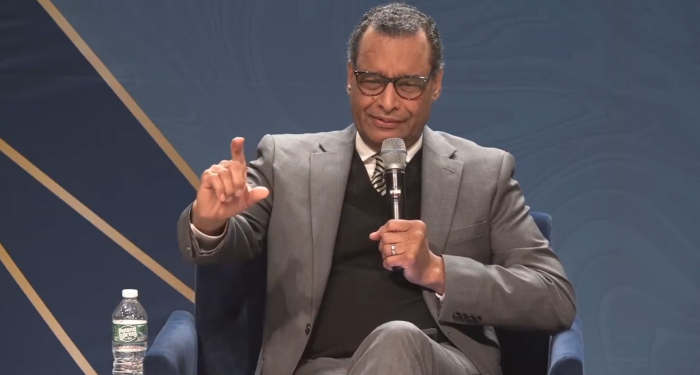Christian psychiatrist reveals 3 things faith leaders can do to protect their mental health

Driven in part by the suicide of her church leader uncle in 2021, Dr. Ayana Jordan, a Christian addiction psychiatrist recommended several things faith leaders can put into practice to ensure they're “functioning optimally” as they work to serve their communities.
Jordan, who is also the Barbara Wilson associate professor of psychiatry in the Department of Psychiatry at NYU's Grossman School of Medicine, shared her professional wisdom with a group of faith leaders at a mental health faith-based summit hosted by the New York City Mayor’s Office of Faith-Based and Community Partnerships at the International Interfaith Research Lab at Teachers College, Columbia University on Thursday.
“So we are not immune to the social isolation and to the emotional and psychological duress that we are experiencing [during the pandemic],” Jordan told the group as she asked faith leaders to “think about the soul as the life source within.”
“What are we feeding our life source to make sure that it's functioning optimally?” she asked.
“I think about the essentials of our existence. Our physical, emotional, social, psychological, and spiritual well-beings. We can't just be totally focused on our spiritual well-being if we're not focused on our emotional, our physical. How can you take care of others if you are not fed?” she posited. “If your diabetes are out of control, if you're depressed, if you are experiencing insomnia? So really understanding our life source has to receive attention in all of those elements.”
Jordan then explained how practicing gratitude, spending time in nature, and self-compassion can help faith leaders experience better mental health.
Gratitude
“Really waking up every day and having a sense of gratitude, really practicing gratitude and saying out loud, I am so thankful for this. Every single day [works],” she explained.
“It's not just having gratitude for the sake of gratitude, but it actually changes, trains our brain to release negativity, and replace it with positive thinking. And that happens in the limbic system, is structured within a vein on either side of the thalamus that actually allows you to release negative thoughts and focus on the positivity.”
Spend time in nature
Breathing in fresh open air is also quite therapeutic, she added.
“Really thinking about how can you spend more time in nature, marvel at God's greatness, and the beauty and wonder therein but also really having that time to breathe in the natural oxygen,” she said. “We don't have to go later into the city to go to an oxygen bar and paying for oxygen. But being in nature and having the opportunity to really breathe in oxygen, allowing our minds to function optimally, allowing our hemoglobin to take the oxygen to places in our organs that we need to thrive.”
Self-compassion
Practicing self-compassion, she added, can help faith leaders and people, in general, avoid burnout.
“So protecting and myopically focused on making sure those essential elements are balanced — the spiritual, emotional, psychological, social and physical — is being compassionate with ourselves. Just because we have an hour free doesn't mean it has to be overscheduled,” she says.
“Sometimes I look at my calendar and I remember I start talking with my project coordinator. I said, 'No, I just need a day.' And I used to feel guilty about that. Like, are you kidding me a day for a black woman in America? Yes, to walk around Harlem and look at the birds. Pigeons. And be grateful for it.”

The Rev. A.R. Bernard, leader of New York City's 40,000-member Christian Cultural Center, who has some 45 years of experience in ministry, was also on a panel discussing the best practices for optimum mental health and he praised Adams for “boldly declaring his relationship with faith and the role that faith plays in his life.”
He also thanked millennials for their work in helping to destigmatize the discussion of mental health in the public square.
“When 9/11 hit, I got a call for a gathering of clergy. Because what they found was that the first responders who were being traumatized by what they were dealing with, on a daily basis, it was so intense. They didn't want to meet with … a health care or mental health professional,” he recalled.
“They wanted to meet with their Imam, their pastor, their priest, a rabbi. That was 22 years ago almost, a lot has changed. One of the reasons why they wanted to meet with their clergy person is because of the stigma associated with mental health and seeking mental health care,” he explained. “Thank you for the millennials, for removing the stigma. So now you can say, I'm going to see my therapist, or like my therapist said to me the other day and not have people look at you funny. We've come a long way. But it was very real. Because along with many, many clergy, some of you here, we felt the stress the trauma that 9/11 brought.”
Bernard also drove home the need for pastors to take sabbaticals as a part of their self-care regime.
“However you arrange your life creates a rhythm. That rhythm establishes a pattern. If that pattern is healthy, good, keep the arrangement. But if that pattern is unhealthy, and causing you deep and profound stress and mental anguish, then you've got to go back to how your life is arranged,” he said.
“The Sabbath was first and foremost, a principle to be practiced before it became a religious identification for people. Because it's during the days of creation that God worked and then rested before there was an Israel. He rested,” Bernard explained.
“If we don't understand the need to rest, then we will arrange our lives, our time, in a way that forces us to rest because work will continue to expand to the time given to it. And if you don't control that, you're gonna burn out,” he added.
Research conducted by Barna Group in January 2021 and March 2022 showed that more pastors faced with stress, loneliness, political divisions and other worries like their church being in decline considered quitting their jobs.
The share of pastors who gave serious consideration to quitting full-time ministry within the last year increased from 29% in 2021 to 42% in March of 2022.
Joe Jensen, Barna’s vice president of church engagement, told The Christian Post at the time that the growing number of pastors now looking to leave their full-time positions is cause for alarm.
“This particular stat, this is the highest we’ve ever seen it,” Jensen said, pointing to the burnout he believes many pastors are experiencing in the wake of the pandemic.
“We’ve been tracking this in our State of Pastors report that we did with Pepperdine University in 2016, 2017. We didn’t have this exact stat but we were tracking burnout. [And] pastors were feeling burnout and the risk factors involved,” Jensen said.
In his presentation, Bernard explained that the failure of pastors to properly incorporate rest in the work can lead to unwanted consequences.
“I've worked with pastors who have burned out, caught some just before they burnt out. One particular church and pastor, he's worked for 30 years, and he took vacations, but he never took a Sabbath. So we actually created a policy and built it into the corporation, the church corporation that requires a Sabbath every seven years, which means that the pastor has to take some time off, not vacation time on a beach, but time to refresh, to renew, to strengthen, which included mental health professional counseling,” the Brooklyn pastor explained.
“And we created a document, and the church had the budget (sometimes a pastor can't afford it) and the church made it a part of the budget. We established that in our church as well. And it's called a sabbatical policy. And sometimes if you don't do it structurally, it's not going to happen.”
Contact: [email protected] Follow Leonardo Blair on Twitter: @leoblair Follow Leonardo Blair on Facebook: LeoBlairChristianPost




























